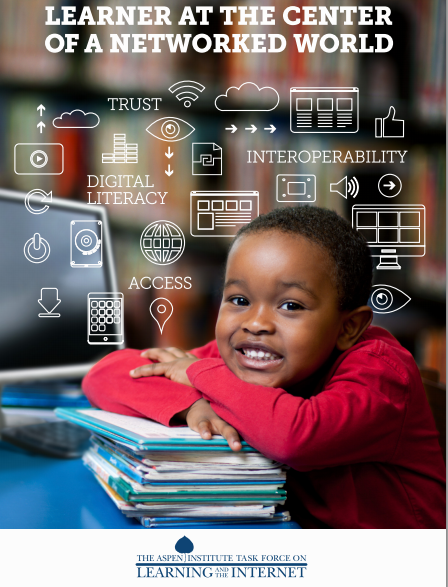Aspen task force would take learning ‘back to the future’
This post first appeared in the San Jose Mercury News
The Aspen Institute Task Force on Learning and the Internet released an outstanding report whose title, “Learner at the Center of a Networked World,” suggests a radical rethinking of how we approach education.
 The report was the product of about 20 leaders with expertise in technology, public policy, education, safety and privacy including my co-director at ConnectSafely.org, Anne Collier. Jeb Bush and Rosario Dawson served as honorary co-chairs.
The report was the product of about 20 leaders with expertise in technology, public policy, education, safety and privacy including my co-director at ConnectSafely.org, Anne Collier. Jeb Bush and Rosario Dawson served as honorary co-chairs.
I’ll get to the report in a moment, but as I read it, I couldn’t help to reflect back to my own experiences from a few decades ago, beginning when I was an undergraduate at UC Berkeley.
In 1967 I had the privilege of being one of the student coordinators of Berkeley’s Center for Participant Education, a student-initiated course program that was born out of Berkeley’s Free Speech Movement. CPE, like other “free universities” and “alternative schools” that popped up around the world in the ’60s and ’70s, promoted student-centered learning by giving students the power to initiate and help direct their own learning, using resources from local faculty, the community and subject matter experts, including some without traditional academic credentials. By getting faculty sponsors, we were able to offer academic credit for non-traditional learning.
There was no Internet back then, but we did have museums, libraries and access to people from the community such as artists, musicians, bakers, bankers, park rangers, social activists, and people with and without all sorts of advanced degrees and impressive credentials, including some who were internationally recognized as leaders in their fields. And — even without the Internet — there were plenty of other resources, including newsletters, films, records, and of course, books and periodicals. We didn’t have blogs, but we did have mimeograph machines and megaphones. But, mostly, we had an attitude that students were the center of their own learning and that any student had the right to help fashion a learning environment, based on his or her own needs and learning style.
In 1969, I moved to Washington, D.C., to run the Center for Educational Reform, a Ford Foundation project of the now-defunct National Student Association, that helped bring this concept to universities and secondary schools around the country. Another nonprofit, New Schools Exchange, published a newsletter that supported hundreds of student-centered “free schools,” where even young children were able to help shape their own learning environment.
Fast forward to 2014. Technology has unleashed incredible resources for individualized learning, but — somewhere between 1970 and today — educational reform got hijacked and redirected by well-meaning policymakers whose strategy seems to be more aimed at preparing students to take standardized tests and less toward student and parent empowerment and the ability for young people to articulate and achieve their own dreams, goals and aspirations.
So, imagine my delight that a group of 21st century experts assembled by the Aspen Institute took us back to the future with recommendations for a “new culture of learning” where “learners must move from the passive absorption of content to a new sense of agency that enables them to find a path that makes sense for their individual interests and learning styles.” These are great ideas, reminiscent of what pundits like John Holt, Ivan Illich, Herb Kohl and Jonathan Kozol wrote back in the ’60s.
What is different of course is that with modern technology there are no more excuses for education to remain in the dark ages. As the Aspen report ably documents, the proliferation of broadband and mobile devices is already “helping students chart their own unique pathways of learning subjects as well as adjusting the pace of their learning.”
I fully support the task force’s recommendations, which include redesigning “learning environments to empower learners to learn any time, any place, and at any pace, both in school and beyond,” as well as building “an infrastructure that will connect all students in all of the places they learn.” The task force also called for open standards and “protocols that simplify and promote interoperability of learning resources” and — my favorite recommendation — that schools adopt “policies to incorporate digital, media and social-emotional literacies as basic skills for living and learning in the digital age.”
I also applaud the Aspen task force for taking on laws like the Children’s Online Privacy Protection Act, which, though intended to empower parents to protect their children’s privacy, has the effect of preventing children under 13 from participating in popular social media services along with what the report called the “unintended consequence of encouraging children to make use of sites that do not attempt to enforce COPPA’s restrictions and that may be less conscientious about protecting young users.”
The task force also calls for “deeper research on the efficacy” and possible negative side effects of privacy and safety laws such as the Family Educational Rights and Privacy Act (FERPA), the Children’s Internet Protection Act (CIPA) and various state laws.
I’m not anti-regulation and I certainly agree that government has a role to play in protecting the privacy of both children and adults, but I agree with the task force that we need to examine the unintended consequences of even the most well-meaning legislation.
Links
Learner at the Center of a Networked World splash page. Full report (PDF)
A task force report & a student bill of rights: Task Force member and ConnectSafely co-director Anne Collier’s commentary about the report and the work of modern-day student activists
Make personalized learning a realty says ed tech task force: Observations and commentary by Family Online Safety Institute (FOSI) CEO Stephen Balkam
